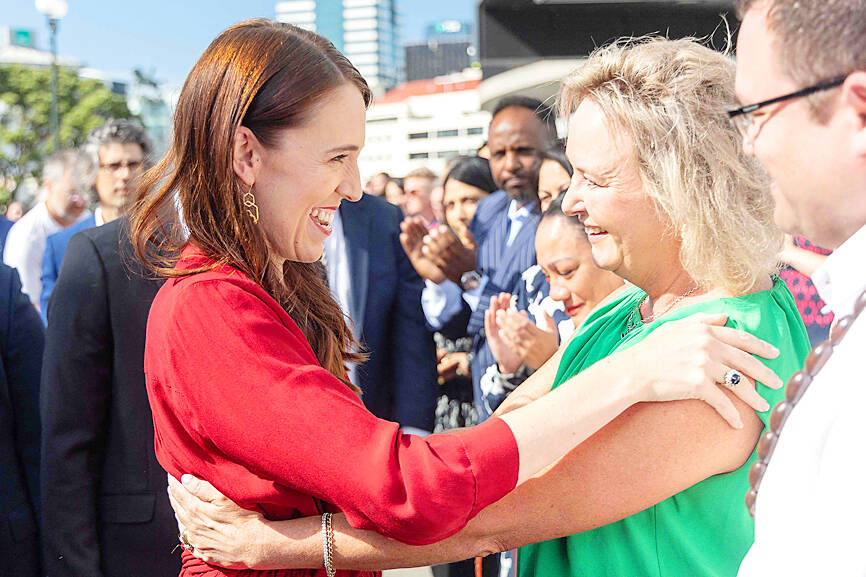New Zealand’s child poverty rates have plateaued, despite government efforts and former New Zealand prime minister Jacinda Ardern making it a central priority of her time in office.
Reducing the country’s child poverty rates has been a central commitment of the Labour government since Ardern ran on the issue in 2017, creating a new minister for child poverty, introducing legislation to ensure child poverty data were measured and published yearly, and bringing in a series of additional financial support packages for low-income families.
While the situation has improved for some children since then, in the 12 months to June last year, New Zealand’s primary measures were unchanged from the previous 12 months, with 12 percent of children living in households that had less than 50 percent of the median household income before housing costs and 15 percent after housing costs.

Photo: AFP
There were 10.3 percent living in material hardship — defined as frequently being without basic essentials such as nutritious food, clothing and doctors’ visits.
The child poverty measures for Maori and Pacific island children were unchanged from the previous 12 months.
Over the longer term, the picture was more positive. Eight of the nine measures of child poverty had statistically significant decreases since June 2018, the baseline year.
The government has framed the plateauing of child poverty reduction as “encouraging” given that inflation is at about 7.2 percent and the economic disruption of restrictions during the COVID-19 pandemic.
“It’s a challenging environment, but child poverty figures staying steady this year is encouraging,” said Jan Tinetti, who replaced Ardern as child poverty reduction minister after her resignation. “It shows the government’s policies targeting kids and families are helping, despite the pandemic and tough economic times.”
However, other political parties have decried the lack of progress.
“It’s not good enough for the government just to say that they care — people need action and results,” National Party spokeswoman Louise Upston said. “The Labour government has delivered a public-housing waitlist that has skyrocketed up from 5,000 to 24,000 since 2017, 3,000 children waking up in motels every day, and an estimated one in five children growing up in benefit-dependent homes.”
“Poverty is a political choice,” Greens spokesman Ricardo Menendez March said. “The tools to lift every family and child out of poverty exist, the government just needs to use them.”

OPTIMISTIC: A Philippine Air Force spokeswoman said the military believed the crew were safe and were hopeful that they and the jet would be recovered A Philippine Air Force FA-50 jet and its two-person crew are missing after flying in support of ground forces fighting communist rebels in the southern Mindanao region, a military official said yesterday. Philippine Air Force spokeswoman Colonel Consuelo Castillo said the jet was flying “over land” on the way to its target area when it went missing during a “tactical night operation in support of our ground troops.” While she declined to provide mission specifics, Philippine Army spokesman Colonel Louie Dema-ala confirmed that the missing FA-50 was part of a squadron sent “to provide air support” to troops fighting communist rebels in

PROBE: Last week, Romanian prosecutors launched a criminal investigation against presidential candidate Calin Georgescu accusing him of supporting fascist groups Tens of thousands of protesters gathered in Romania’s capital on Saturday in the latest anti-government demonstration by far-right groups after a top court canceled a presidential election in the EU country last year. Protesters converged in front of the government building in Bucharest, waving Romania’s tricolor flags and chanting slogans such as “down with the government” and “thieves.” Many expressed support for Calin Georgescu, who emerged as the frontrunner in December’s canceled election, and demanded they be resumed from the second round. George Simion, the leader of the far-right Alliance for the Unity of Romanians (AUR), which organized the protest,

ECONOMIC DISTORTION? The US commerce secretary’s remarks echoed Elon Musk’s arguments that spending by the government does not create value for the economy US Secretary of Commerce Howard Lutnick on Sunday said that government spending could be separated from GDP reports, in response to questions about whether the spending cuts pushed by Elon Musk’s Department of Government Efficiency could possibly cause an economic downturn. “You know that governments historically have messed with GDP,” Lutnick said on Fox News Channel’s Sunday Morning Futures. “They count government spending as part of GDP. So I’m going to separate those two and make it transparent.” Doing so could potentially complicate or distort a fundamental measure of the US economy’s health. Government spending is traditionally included in the GDP because

Hundreds of people in rainbow colors gathered on Saturday in South Africa’s tourist magnet Cape Town to honor the world’s first openly gay imam, who was killed last month. Muhsin Hendricks, who ran a mosque for marginalized Muslims, was shot dead last month near the southern city of Gqeberha. “I was heartbroken. I think it’s sad especially how far we’ve come, considering how progressive South Africa has been,” attendee Keisha Jensen said. Led by motorcycle riders, the mostly young crowd walked through the streets of the coastal city, some waving placards emblazoned with Hendricks’s image and reading: “#JUSTICEFORMUHSIN.” No arrest